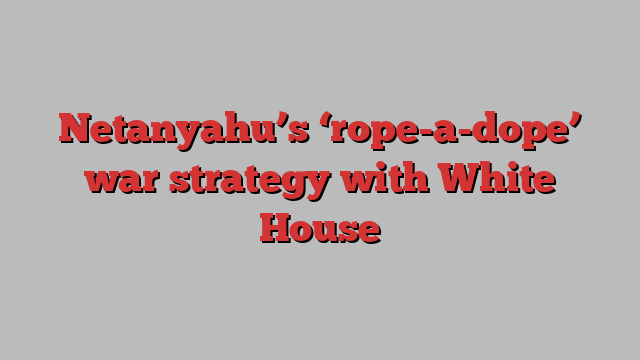
Within two weeks of Hamas’s October 7 attack, US President Joe Biden flew into Tel Aviv to show his support to Israel, telling the traumatised nation that America “will not let you ever be alone”.
But he also had words of caution, warning Israel not to be consumed by “rage” and repeat the US’s mistakes after the September 11, 2001 attacks. The inference, as Israel launched a thunderous offensive against Hamas in Gaza, was clear: do not get drawn into years-long wars as the US did in Iraq and Afghanistan.
Yet for almost a year, Israeli Prime Minister Benjamin Netanyahu has persistently rebuffed the advice of his nation’s most important ally at a time of deepening regional crisis.
Israel is still fighting in Gaza, while dramatically ramping up its assault against Hizbollah, the Iranian-backed militant movement in Lebanon. On Monday, Israel’s largest air assault on Lebanon in decades killed more than 500 people, a dramatic escalation that edges the Middle East closer to the all-out, multi-front war the US has spent months trying to prevent.
For many, it underlines how Biden, a self-avowed Zionist, is unwilling to use Washington’s leverage over Israel both because of his emotional attachment to Israel and domestic political calculations.
“If you look at what Netanyahu has done over the course of the last year, it’s [to] prioritise his own calculations about what was best for either him or the state of Israel . . . regardless of what the US suggested,” said Steven Cook at the Council on Foreign Relations. “Netanyahu is going to do what Netanyahu is going to do. He’s going to move the goalposts and rope-a-dope Biden.”
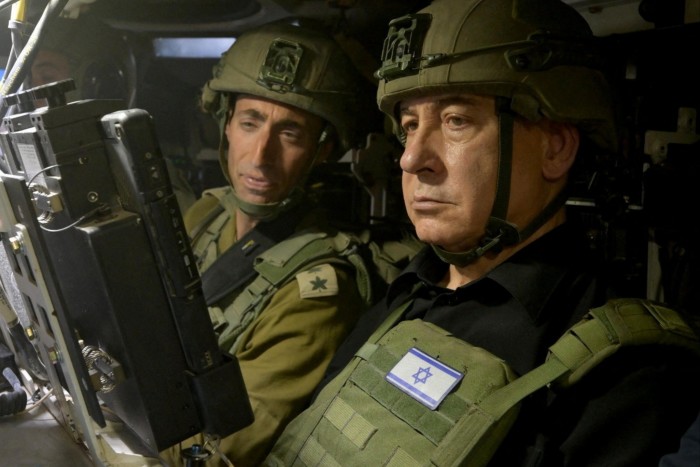
The US initially convinced Netanyahu’s far-right government not to launch a pre-emptive offensive against Hizbollah shortly after it began firing rockets at Israel on October 8. But in the months since Israel and Hizbollah have exchanged intensifying fire as the US sought to broker a deal to end the hostilities.
That diplomatic push depends on the success of US-led efforts to secure a ceasefire and the release of hostages in Gaza, as Hizbollah insists it will continue striking Israel as long as the war in the Palestinian strip continues.
Yet Netanyahu has shown little appetite for a ceasefire in Gaza, instead insisting on “total victory” against Hamas and now launching a “new phase” of the war against Hizbollah. “We are not waiting for the threat, we are pre-empting it — everywhere,” Netanyahu said on Monday.
When he has come under pressure from the US and Israel’s other western allies, Netanyahu has sought to exploit it to his own political advantage, telling Israelis that he is defying global powers to pursue Israel’s war goals.
All the while, Biden has made it clear that he does not want to use his main points of leverage — withholding US military aid or assistance. The one time he did suspend an arms shipment, it was for a batch of 2,000lbs bombs in early May as Netanyahu insisted on launching an offensive on Rafah, the southern Gazan city where more than 1mn Palestinians had sought sanctuary.
The US, other western powers and UN agencies warned about the dire impact such a military operation would have on Gaza’s humanitarian crisis, but Israel went ahead and had seized control of Rafah by the end of the month.
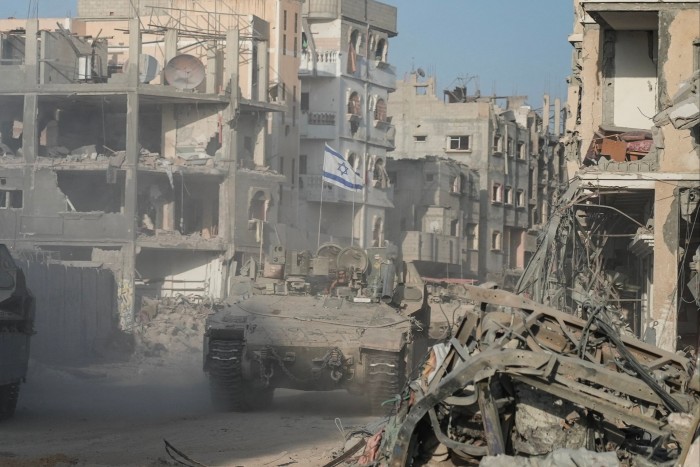
There have been other moments when Biden has expressed his frustration with Netanyahu’s conduct of the war.
Six months before the Rafah offensive he warned that Israel’s “indiscriminate bombing” in Gaza risked leaving the country isolated and said Netanyahu “has to change”. The Biden administration has also for months pressed Israel, with limited success, to improve the delivery of aid to Gaza, amid warnings about the threat of famine and widespread disease in the besieged strip.
This month, when Biden was asked if Netanyahu was doing enough to reach a ceasefire with Hamas he replied with a blunt “no”.
Yet he also repeatedly reiterates the US’s “ironclad” commitment to Israel’s defence. The US has provided Netanyahu’s government with more than $12.5bn in military assistance since October 7, and on Monday said it was deploying additional troops to the region to act as a deterrent and defend Israel.
Michael Wahid Hanna, US programme director at Crisis Group, said those running the administration’s policy have never been interested in “strong-arming” Israel into a ceasefire deal.
Biden could be using arms sales, the UN Security Council and diplomatic support for Israel to pressure Netanyahu, he said. But with US elections just over a month away, “it’s hard to imagine an American administration courting that level of diplomatic friction with Israel”.
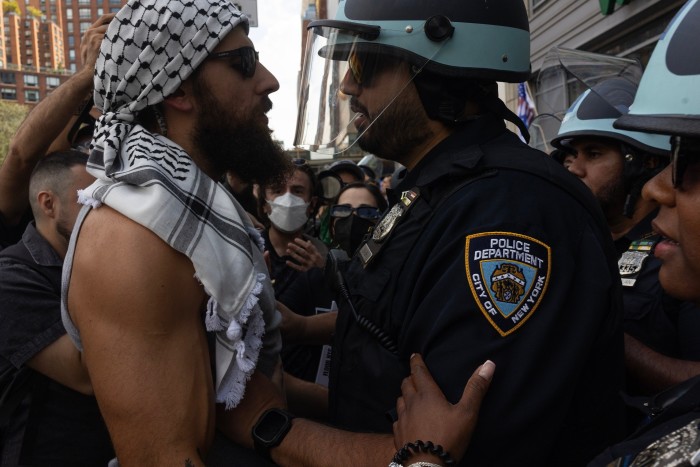

While Biden, and vice-president Kamala Harris, the Democratic candidate, risk losing support from Americans who oppose Israel’s military action, they also risk alienating pro-Israeli voters. Yet a spiralling conflict in the Middle East could also damage Harris’s election campaign, particularly if US troops are drawn into combat.
“There are huge potential downside risks to the Harris campaign from an all-out war,” Hanna said. “[Donald] Trump has talked a lot about the chaos that has happened under the administration . . . It will be a theme in the coming days that ‘this is a reflection of American weakness.’”
One former western intelligence official said the Israeli escalation gives Netanyahu an “opportunity to make life difficult for the Biden administration”, in the belief that a Trump victory would best serve Netanyahu’s interests.
“If he could be the source of the October surprise that gives Trump an opportunity to come back, then he’d be very happy to do that,” the former official said.
Even some administration officials privately lament that there is little Washington can do to influence Israel’s behaviour so long as Biden refrains from using American leverage with military sales.
But Biden, and many in his administration, consider defending Israel as fundamentally important to American security, and worry that withholding weapons or publicly criticising Israel would send the wrong signal to Iran and its proxies. They add that much of the world overstates how much sway Washington has over Israel.
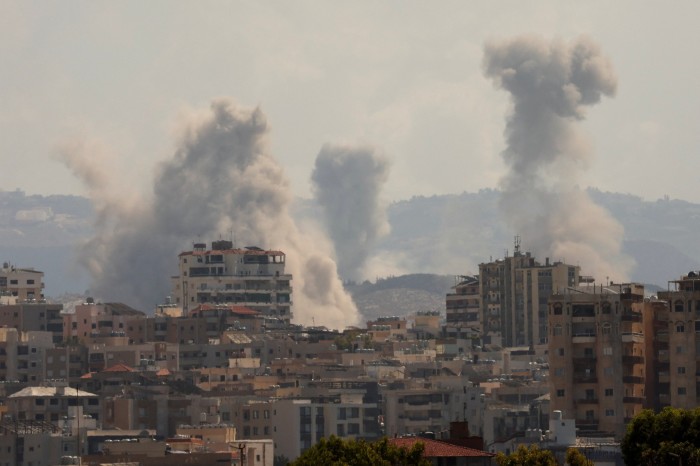
Privately they worry that Israel’s surge of attacks against Hizbollah could spiral out of control, even if Israel has indicated to them it doesn’t want a ground invasion. But some in the administration agree with Netanyahu’s ostensible logic of escalating to de-escalate, particularly when it involves Hizbollah and its patron Iran.
After Israel’s wave of strikes struck Lebanon on Monday, Biden said his “team had been in constant contact with their counterparts, and we’re working to de-escalate in a way that allows people [displaced Israelis] to return to their homes safely”.
Brett McGurk, Biden’s Middle East adviser, said last week that Washington had disagreements with the Israelis “on tactics” and “escalation risk” but added he was “confident that through diplomacy, through deterrence and other means, we’ll work our way out of it”.
But Hanna said that the administration was taking a “big roll of the dice that the US is not in control of”.
“And that’s a particularly dangerous place to be,” he said. “In terms of what that might mean for US engagement and more direct military conflict; what it might mean for regional stability, American standing, politics and legacy.”

